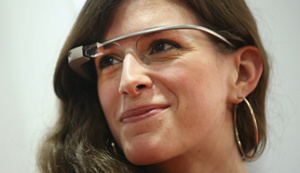(单词翻译:单击)

As the market for smart glasses heats up, Google faces the difficult challenge of displaying top-quality visual images on a screen the size of a fingerprint.
随着智能眼镜市场逐步升温,谷歌公司(Google)开始面临一个棘手难题——如何在指纹大小的屏幕上显示高品质的图像。
Now researchers led by scientists at the University of Oxford in the UK believe they may have made a discovery that solves that problem.
现在,由英国牛津大学(University of Oxford)科学家领头的研究者们相信,他们已经找到了解决这个问题的办法。
Writing in the journal Nature Thursday, Harish Bhaskaran, Peiman Hosseini and C. David Wright say they have found a way to create pixels just a few hundred nanometers across that could one day lead to high-resolution, low-energy and flexible displays. They could be used in smart glasses as well as synthetic retinas, smart contact lenses and foldable screens.
上周四《自然》杂志(Nature)发表了一篇论文。哈利什o巴斯卡仁、培曼o侯赛尼和C.大卫o赖特在文中称,他们已经找到一种方法,可以制造出只有几百纳米的单个像素点,今后就能制造高分辨率、低能耗且可折叠的显示器。这种显示器可以用于制造智能眼镜、人工视网膜、智能隐形眼镜和可折叠屏幕。
“Current microdisplay technologies based on liquid crystals, microelectromechanical systems and organic light-emitting diodes are attracting considerable attention because of a growing interest in wearable technology,” the authors wrote in the paper published Thursday.
作者在这篇论文中称:“由于市场对可穿戴技术的兴趣日益浓厚,目前基于液晶、微机电机械系统和有机发光二极管的微显示技术正备受关注。”
“Key requirements for such applications are high resolutions, high speed and low power consumption, all of which are met by the technology described here.”
“这类应用的关键要求是高分辨率、高速度和低能耗,这些都能通过本文阐述的技术获得解决。”
Essentially, the researchers have come up with a novel use for phase-change materials, which has been around for decades. They have long been used to store data, especially on rewriteable CDs and DVDs. But until now no one had figured out how to tap into their display potential.
实际上,这些研究者所开发的是对相变材料的全新运用方法。这种材料问世几十年了,长期以来一直用于存储数据,主要用于制造可擦写CD和DVD。不过迄今为止还没人想出如何开发这种材料潜在的显示性能。
Bhaskaran said he was initially attracted to the material because it was active both optically and electronically. But it wasn’t until he and his colleagues started working with it in the lab that they realized that its optical properties far outperformed what is available on the market today — a resolution that is 50 times better.
巴斯卡仁称,最初之所以被这种材料吸引是因为,它的光电特性都很活跃。而直到他和同事开始在实验室对它开展研究时才发现,它的光学性能远超过如今市场上的各种材料——分辨率要高50倍。
“The first thing we demonstrated is you can actually get extremely high resolution pixels,” Bhaskaran said. “In our case, the smallest pixels we’ve shown are 100 nanometers or less. Each of those images are 70 microns across, which is roughly the diameter of a human hair.”
巴斯卡仁说:“我们首先发现,能获得超高的分辨率像素点。在我们的研究中,最小的像素点只有100纳米,甚至更小。这样,每幅图像就只有70微米宽,大概相当于头发丝的直径。”
The researchers have filed a patent on their product and are in discussions with an unnamed firm that specializes liquid crystal display applications, Bhaskaran said. They also have received a grant of $240,000 to develop a prototype from Isis Innovation, which helps Oxford researchers commercialize their discoveries.
巴斯卡仁称,他们已为自己的产品申请了专利,正在与一家专业生产液晶显示设备、不便透露名字的公司洽谈合作。他们还从Isis Innovation(牛津大学的技术商业化公司——译注)获得了24万美元用于开发原型产品。后者致力于帮助牛津大学的科研人员将研究成果商业化。
Richard Holliday, a technology transfer team leader at Isis, said that the discovery could lead to very “disruptive display technology” if the researchers can find the right use for it. One area worth exploring, he said, is virtual reality gaming.
Isis公司的技术转移团队主管理查德o霍利迪表示,如果这些研究人员能为自己的产品找到合适的用途,这项发现将催生非常“具有颠覆性的显示技术”。其中一个很值得探索的领域就是虚拟现实游戏。
“The display market is huge. It’s predicted to be $165 billion in 2017,” Holliday said. “At the moment, we are looking at which segments of that market would benefit most from the unique characteristics this technology has got. One of the most exciting is projection-based displays where you project a small display up into a larger area. Therefore, you need high resolution otherwise you end up with a highly pixilated-type display.”
他说:“显示市场规模巨大。据估计,到2017年这个市场的规模将达1650亿美元。目前,我们正在研究其中哪个细分市场能最大程度地从这项技术的特性中获益。最激动人心的一个领域就是投影类显示设备,这种设备可将尺寸较小的画面投射到更大面积的区域上。因此,必须要有极高的分辨率才行,否则只会得到严重失真的投影图像。”
Along with its high resolution, Hosseini said another attractive aspect of the technology is that uses much less energy.
除了高分辨率之外,侯赛尼表示这项技术另一个极富吸引力的特性就是能耗极低。
“One of the advantages of our design is that, unlike most conventional LCD screens, there would be no need to constantly refresh all pixels,” he said. You would only have to refresh those pixels that actually change (static pixels remain as they were). This means that any display based on this technology would have extremely low energy consumption.”
他说:“我们这个设计方案的一个优势在于,和大多数传统液晶屏幕不同,它不需要不断刷新所有像素点。只需要刷新那些确实发生变化(静止像素则保留原样)的像素就可以了。它意味着,基于这一技术的所有显示器的能耗都会极低。”
When asked about the new technology’s commercial merits, Google GOOG -0.86% said they had “nothing to add here.”
当被问及这项新技术的商业优势时,谷歌公司表示“没有什么可补充的”。


